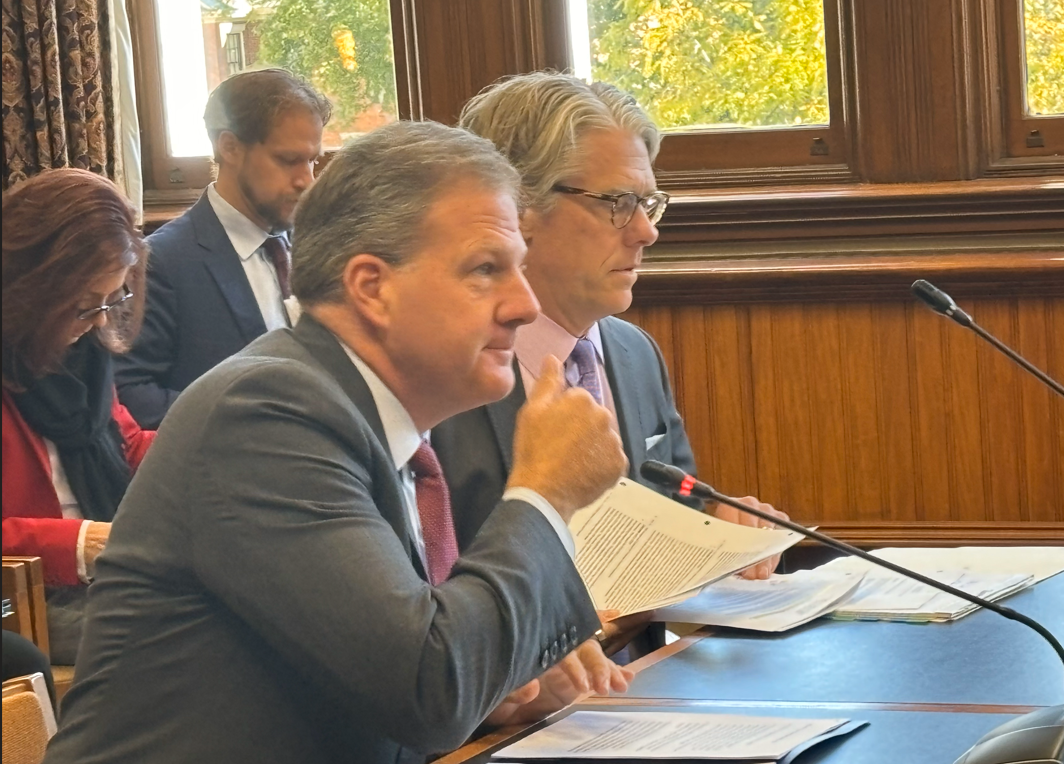By PAULA TRACY, InDepthNH.org
CONCORD – With the clock running out on the state spending federal American Rescue Act funds, Gov. Chris Sununu went to the legislative fiscal committee Friday to ask for the last of the commitments to the almost $1 billion in post COVID-19 recovery funds received in New Hampshire.
Sununu said about $15 million in ARPA funds which were committed but returned to the state when a major project for a 144-bed mental health care facility in Londonderry with SolutionHealth fell through due to the town rejecting it, necessitated $13.78 million to be reallocated, mostly to mental health needs.
The committee unanimously approved the governor’s requests.
By law, the state must commit ARPA funds by the end of this calendar year or return it to Washington and has until the end of next year to complete the projects’ funding. Whatever is left will go into a “waterfall” account, said Taylor Caswell, commissioner of the department of Business and Economic Affairs, so no money will be returned.
Sununu noted that the decision in Londonderry to vote against the facility was “foolish.”
But he asked the committee to agree to reallocate about $2 million of those funds for an eight-bed mental health facility which would move some individuals out of the State Hospital, thus freeing up those beds and putting their placement in a more appropriate setting for their care.
Another $3 million will go to updates to the former Hampstead Hospital which has become a residential facility for youths and young adults facing mental health needs. The 100-acre property will also become the new site for the Sununu Youth Services Center in Manchester which is due to close.
The governor has focused using most of the ARPA money on one-time state purchases rather than ongoing needs of the state.
He asked also, and received from the fiscal committee money for duct work at the men’s prison totaling $685,000.
There was more ARPA funding approved under the governor’s request for the Department of Administrative Services for $1.3 million for State House compliance issues with Americans with Disabilities Act for bathroom upgrades and $2.4 million for the Legislative Office Building including electrical and plumbing and removal of hazardous waste.
Finally, the fiscal committee approved a $500,000 request by the governor to create a fund for towns to tap into to analyze problems related to cyanobacteria in the water (see related story at InDepthNH.org).
State Rep. Jess Edwards, R-Auburn, asked Sununu and Caswell some “in the weeds” questions.
He said the design review process for Hampstead Hospital is going to have a walkway on the campus which will connect the hospital and the new Youth Development Center as an integrated facility.
“I think it is important that that walkway be covered and secure to move people, patients and supplies in winter,” Edwards said.
Another issue he had was integrating services between the two different facilities on the same campus in terms of security and the third were concerns about whether drones can be used to drop items into the recreational center there.
Sununu said the enclosed walkway would cost $1 million and is not in the budget because it is financially prohibitive.
If a less expensive measure could be found it could be incorporated, possibly later, Sununu said.
“The needs are more on the beds and the additional security pieces that I know the residents (of Hampstead) are looking for,” Sununu said.
As far as drone technology, Lori Weaver, commissioner of state Health and Human Services Department, said she is talking with law enforcement about imposing a no fly zone.
Sen. Regina Birdsell, R-Hampstead, asked about payment in lieu of services to the town and said $191,000 which the legislature sent them as a one-time matter doesn’t cover costs.
Sununu said he assumed there will be more for the legislature to determine other than that one-time expenditure.
“It’s what they have spent in the past that I am concerned about,” Birdsell said.
Sen. Cindy Rosenwald, D-Nashua, asked Weaver about the Psychiatric Residential Treatment Facility and the bed census.
The plan was first for 12 beds, but Rosenwald asked how is it that the department was building a 12-bed unit and it turned out it was only a six-bed unit.
Weaver said this is the first PRTF, Psychiatric Residential Treatment Facility, the state has had.
In the past, the state has had to send youths out of state for services and that has not always gone well.
The focus now is making single bedrooms, Weaver said.
Sununu said he spoke with others in experience with such PRTF beds at McLean Hospital in Massachusetts, who told him the federal guidelines are one thing but truly meeting the needs of these kids require “some editing.”
The fiscal committee also agreed to $5 million to create a new summer food benefit program for 44,000 needy children under the Electronic Benefits Transfer program.
The state will have to reapply annually for the program and there is a combination of state funds to stand up the program and federal monies, not ARPA.






